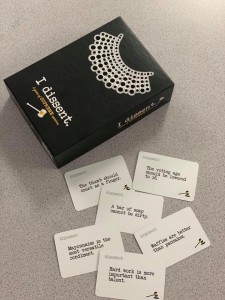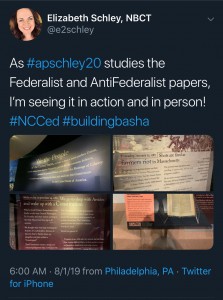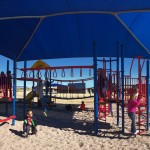Teaching an AP class can be incredibly stressful. There is so much content to go over, make sure students are ready for their exam, and don’t forget all the required documents and Supreme Court cases they need to know. I am in my 6th year of teaching it and the pressure still exists. Required documents, Supreme Court cases, current events… it’s a lot. Especially the deluge of current events surrounding government and politics.
Even with that pressure, I spend the first day of school building my community because I know that students cannot learn in a space they don’t feel valued. Because of my subject matter, the often see politics as divisive. I want to make sure my classroom doesn’t feel like that.
Look, I don’t need to start out with rules and regulations. I feel like, especially with seniors, it sets a tone that I am the boss and this is MY classroom. It’s not. It’s our classroom.
This year was important to build a positive community because I would be attending a conference in Philadelphia the entire second week of school and was worried that this would disrupt the community building. I made the choice this year to start my first day with game instead of going over the syllabus. I need my students to feel comfortable in class and with me. I need them to see a small part of my teaching since I was going to be away, especially because I was going to be asking them to do some heavy lifting in reading Federalist 10 and Brutus I. I needed them to know that I believed in them and would not let them fail. I needed this all to happen in my week long absence.
I took a game that I bought at Target and just used the discussion cards. I was able to see who my students were, how they interacted with each other, and get a sense of what the personality of the class was in a nonthreatening way. ( I mean, eating mac and cheese with a spoon or a fork got slightly intense). Students left with confused smiles, but nonetheless seemed comfortable in class on our first day. They also left with an understanding that regardless of background, we all have some common ground. Our class is a place to learn, to have fun, and to question everything.
To maintain the relationships I started to build, I invited students to follow my adventures on Twitter. We use a class hashtag so both students and myself can follow that instead of each other. Because I was in Philadelphia, studying at the National Constitution Center, I was able to share my experience with primary sources (like the Declaration or the Federalist Papers) with the students as they studied those same documents.
I came back from my conference and got back to work in my classroom community. I made sure to learn names, look students in the face and say their name as much as possible. I met them at the door to say good morning. Spending my first days building my classroom community has paid off. My students feel valued and seen. Would they have felt that way if I spent the first day going over the rules, the curriculum that we were going to learn, or the process of going to the bathroom? Or was modeling how our community works and addressing those small things as we go a way to set up for success for the year?
The community was evident the day we did a Socratic discussion on essays we had read regarding federalism. Students asked each other questions, were respectful, and absolutely knocked it out of the park. Watching my students interact with each other and respectfully disagree validated my decision to spend my first days building that community.












Comments 4
I love this! I don’t go over my syllabus until much later in the week. We play games, talk about their summer reading project, and simply get to know each other. I challenge them that I will learn every one of their names (all 150 kids I have all day) by the end of the week. If I can, I give them extra credit on a quiz. They love it because they are rooting for me and actually learning each other’s names in the process. I believe students need to feel comfortable with me and their peers before we can start doing the heavy lifting of learning. I also love how you stayed connected with your students while you were away. What is the card game you used? I would love to buy it.
Author
Thanks Leah! I think it’s so important to build community because it’s not MY classroom, it’s OUR classroom! The game is called “I Dissent” and I got it at Target!
Kyle Bragg’s recent blog talks about burying the curriculum the first few days of school. Your post makes the same points that he did. It is so important to go slow at the beginning and build relationships. You can always pick up the pace in the curriculum later but you won’t be able to repair those relationships that you lost if you don’t spend the time building them.
Target just made another sale. Don’t tell my daughter, RBG is her role model and it will now be a gift. With that said, why do we do that to teachers? They come back to school and many times we just jump right into rules and give teachers no time to talk, build trust, become a team. What is good for adults is good for kids and I hope that systems can get better at serving both.